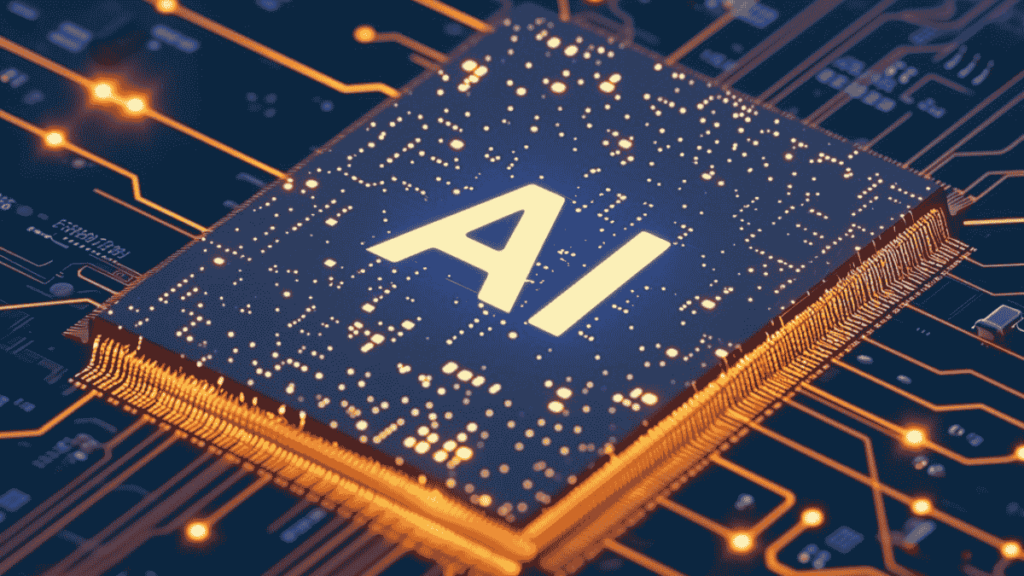Artificial Intelligence (AI) has transformed the world. Software often gets the spotlight, but hardware plays an equally critical role. Specialized AI chips handle the heavy computations needed to run advanced AI applications smoothly.
Big tech companies like NVIDIA, AMD, and Google focus on developing advanced chips for AI. These chips power tools like driverless cars, chatbots, and recommendation systems.
The competition to build better chips has intensified in 2024. Companies aim to make chips faster, smaller, and more energy-efficient. Every advancement transforms how AI interacts with the world.
Why AI Chips Are Important
AI models require tremendous computing power. Whether it’s generating images, understanding language, or controlling smart devices, performance depends on efficient chips.
AI hardware companies race to develop faster, smarter, and more power-efficient chips. Every improvement helps AI systems learn, train, and make decisions better. This year saw an unprecedented level of competition and innovation in the AI chip market.
Indian Startups Enter the AI Chip Race
India entered the global AI chip market with Vicharak, a Surat-based startup. Despite the challenges of building hardware from scratch, the company made a bold move.
Vicharak created Vaaman, a compact computing board with cutting-edge features:
- A six-core ARM CPU.
- An FPGA (field-programmable gate array) with 1,12,128 logic cells.
- 300 Mbps FPGA-CPU connectivity for parallel computing.
This innovative design ensures better hardware acceleration and seamless AI workloads. The startup secured ₹1 crore in funding, boosting its valuation to ₹100 crore.
Vicharak’s founder, Akshar Vastarpara, emphasized their mission to revolutionize computing technology. “Our goal is to build AI chips for mobile devices and scale to servers and data centers,” he said.
Also read | What is Langflow? A Simple Guide to Building AI Workflows
NVIDIA’s Groundbreaking AI Hardware
NVIDIA led the AI hardware revolution in 2024 with multiple launches:
- H200 Tensor Core GPU:
Designed for high-performance computing and generative AI. It introduced faster HBM3E memory for improved efficiency. - B100 GPU:
Built using Blackwell architecture, this chip focused on AI training and inference workloads. - GH200 Chip:
A hybrid chip combining GPU and ARM-based CPU capabilities, ideal for complex AI applications.
NVIDIA also launched the DGX H200 system. This system powers AI servers with record-breaking performance.
In partnership with OpenAI, NVIDIA delivered advanced GPU systems, including the DGX B200, to accelerate AI research.
Google’s Advanced AI Chips
Google pushed the boundaries with its Cloud TPU v5p chip, designed for training large language models (LLMs) and generative AI systems.
Key features of TPU v5p:
- Each pod contains 8,960 chips.
- Bandwidth of 4,800 Gbps for faster data transfer.
Google also unveiled Trillium, a high-performance AI chip for data centers. These chips made Google Cloud a leader in AI infrastructure.
Also read | 5 Free AI Courses from Google to Supercharge Your Skills
AMD Enters the High-Performance AI Market
AMD launched several advanced chips, making headlines in 2024. Key innovations include:
- MI300X and MI300A Chips
- MI300X: A GPU with 304 compute units
- MI300A: Combines a GPU and 24 CPU cores
- Epyc and Ryzen Processors
- Built with the latest Zen 5 microarchitecture
- Enhance AI performance significantly

AMD’s chips compete closely with NVIDIA’s H100, especially in memory capacity and efficiency.
AWS Builds AI Infrastructure with Custom Chips
AWS shifted focus to chip development, launching its second-generation Trainium 2 AI chip. It improves the price-performance ratio for AI model training.
Trainium 1
- Offers scalable AI training solutions
- Saves costs by optimizing large models
Trainium 2
- Planned for release in late 2024
- Promises better price performance for AI training
AWS also upgraded its cloud instances:
- Trn1.32xlarge instance: Features 16 Trainium accelerators, 512 GB memory, and 1,600 Gbps network bandwidth.
AWS also developed Inferentia, reducing costs by 40% for generating AI responses. These advancements support deep learning and large-scale generative models.
Also read | Elon Musk’s AI Supercomputer xAI: Set to Dominate the Market
Intel’s Gaudi 3 Chip Challenges NVIDIA
Intel introduced the Gaudi 3 AI chip at its AI Everywhere event in 2024.

Highlights of Gaudi 3:
- Twice the power efficiency of its predecessor.
- Runs AI models 1.5 times faster than NVIDIA’s H100 GPU.
- Built on a 5 nm process for superior performance.
Intel plans to use this chip in upcoming AI projects, including manufacturing at its new Ohio factory.
Cerebras Systems and Edge AI Chips
Cerebras Systems developed Condor Galaxy 3 (CG-3) in collaboration with G42. This system includes:
- 64 CS-3 systems powered by WSE-3 chips
- 4 trillion transistors per chip
- Eight exaFLOPs of computing power
The WSE-3 chip offers double the performance of its predecessor, ensuring efficient AI training.
Apple’s M4 Chip Advances AI Capabilities
Apple unveiled the M4 chip for iPad Pro. It features:
- A neural engine three times faster than the M1 chip
- A CPU 1.5 times faster than the M2 chip
Apple’s AI hardware innovation strengthens its position in consumer electronics.
Also read | What’s New with Apple AI: Exploring the Latest Innovations
IBM’s NorthPole AI Chip in the Works
IBM continued its AI hardware advancements in 2024 with:
- Telum II Processor for next-generation IBM Z systems
- Spyre Accelerator announced at the Hot Chips conference
The upcoming NorthPole AI chip promises groundbreaking performance once released.
Why AI Chips Are Essential
AI chips are crucial for real-time processing, training, and inference. They power:
- Chatbots
- Smart assistants
- Autonomous vehicles
- Recommendation engines
With advancements in AI, the demand for efficient chips will continue to rise.
Conclusion:
2024 marked significant advancements in AI hardware. Companies like NVIDIA, AMD, and startups like Vicharak drove this transformation.
As AI grows, innovation in chip technology will shape its future. The race for better, faster, and smarter chips continues to intensify.
AI chips are no longer behind the scenes—they are the spotlight of innovation in 2024.

